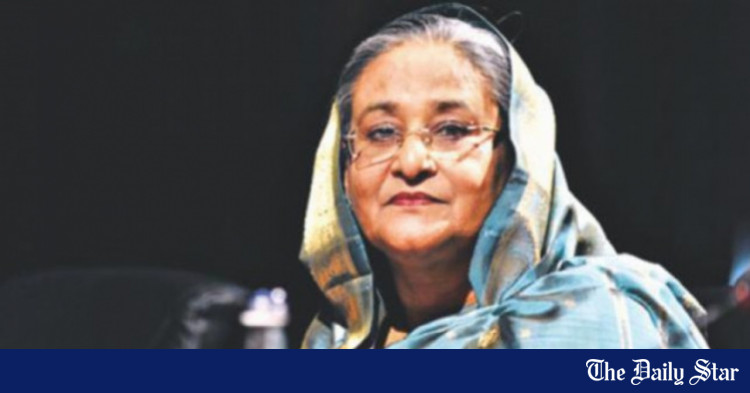Nine more murder, ICT cases filed against Sheikh Hasina
File photo of Sheikh Hasina
At least nine more cases were filed today against former prime minister Sheikh Hasina on various charges including murder across the country.
Of them, one was filed over a crackdown on a Hefajat-e-Islam rally at Motijheel's Shapla Chattar on May 5, 2013.
The complaint was filed with the investigation agency of the International Crimes Tribunal today accusing the former PM and 23 others of committing crimes against humanity and genocide during the crackdown.
Besides, eight more cases were filed against Hasina today accusing her for killings committed during the recent unrest centering on the quota reform movement which ultimately turned into a mass uprising that toppled the Hasina-led Awami League government on August 5.
With these cases, Hasina is now facing 31 cases, including 26 on charges of murder, four on charges of crimes against humanity and genocide and one for abduction.
For the first time, Hasina's son Sajeeb Wazed Joy, daughter Saima Wazed Putul and sister Sheikh Rehana were made co-accused in a killing case.
ICT case
Supreme Court lawyer Gazi MH Tamim filed the complaint on behalf of Mufti Harun Ijahar Chowdhury, joint secretary general (education and law) of Hefajat.
"We have registered the complaint, and thus the investigation has started from today [Tuesday]," Ataur Rahman, deputy director (admin) of the investigation agency, told The Daily Star today.
"Once we complete preliminary investigation and visit to the place of occurrence and the tribunal is reconstituted, we, through the prosecution, will seek arrest warrants against all the accused," he said.
The other accused are Obaidul Quader, AL general secretary and former road transport and bridges minister; Rashed Khan Menon, former minister; Sheikh Fazle Noor Taposh, former mayor of Dhaka South City Corporation; Hasan Mahmud, former minister; Haji Selim, former lawmaker; Salman F Rahman, former advisor to prime minister; Shamim Osman, former Narayanganj lawmaker; Tarique Ahmed Siddique, former security advisor to the prime minister; AKM Shahidul Haque, former inspector general of police; Benazir Ahmed, former inspector general of police; Ziaul Ahsan, former additional director general of Rab; Harun Or Rashid, former additional commissioner (DB) of Dhaka Metropolitan Police (DMP); Biplab Kumar Sarker, former deputy commissioner of DMP; Shahriar Kabir, president of Ekattorer Ghatak Dalal Nirmul Committee; Prof Muntassir Mamoon, member of Nirmul Committee; Tureen Afroz, former prosecutor of ICT and member of Nirmul Committee; Imran H Sarker, convener of Gonojagoron Mancha; Mozammel Haque Babu, chairman of Ekattor TV; Ahmed Zobayer, former managing director and CEO of Somoy TV; Subhash Singha Roy, editor of ABnews24.com; Naimul Islam Khan, former press secretary of prime minister; Aziz Ahmed, former army chief; and M Manzur Ahmed, former DG of NSI.
Besides them, some unnamed ministers, state ministers and lawmakers, unnamed individuals from law enforcement agencies and the then policy makers of some electronic and print media were accused.
According to the complaint, the accused, by giving directives and plan, committed crimes against humanity and genocide by killings Hefajat activists in Dhaka and surrounding areas and in different districts including Chattogram, Narayanganj and Cumilla in between May 5 and 6, 2013.
On that day, the Hefajat men locked in deadly clashes with law enforcers and the ruling Awami League men and turned the capital city into a battlefield. They set fire to hundreds of shops, vehicles and police outposts and looted shops, including those having Islamic books.
The Hasina-led government in March 2010 formed the International Crimes Tribunal (ICT) to try those who committed crimes in 1971. A second ICT was formed later. Five Jamaat and a BNP leader were executed following the verdicts of the two tribunals.
OTHER CASES
Sheikh Hasina, her son Sajeeb Wazed Joy, daughter Saima Wazed Putul and sister Sheikh Rehana, and 17 others were sued in a case was filed over the killing of fruit seller Farid Sheikh at Hanif Flyover Toll Plaza in the capital's Jatrabari on August 5.
Victim's father Sultan Miah filed the case with the court of Dhaka Metropolitan Magistrate Md Shakil Ahmed.
After the hearing, the magistrate recorded the statement of the complainant and asked Police Bureau of Investigation to submit a report on October 1.
Another case was filed against Hasina and 49 others over the death of Md Omar Faruque, a student of Kabi Nazrul Government College, at Laxmibazar of Sutrapur on July 19.
Faruque's mother Kulsuma Akhter lodged the case with the court of Dhaka Metropolitan Magistrate Md Tariqul Islam.
Magistrate Tariqul recorded the statement of the complainant and asked officer-in-charge of Sutrapur Police Station to register the complaint as a first information report (FIR).
Meanwhile, Hasina and 24 others were sued for the death of 18-year-old garment worker Sohel Rana in the city's Adabor area on August 5.
Sohel Rana's brother Mohammad Ibrahim filed the case with the Court of Dhaka Additional Chief Metropolitan Magistrate Md Sultan Sohag Uddin.
The magistrate recorded the statement of the complainant and directed the officer-in-charge of Adabor Police Station to register the complaint as a first information report (FIR).
In Savar, Sheikh Hasina and 75 AL men were sued over the murder of a barber shop worker in Savar on 5 August.
The case was filed with Chief judicial Magistrate court yesterday. The court has ordered the police to record the case at Ashulia Police Station within three days.
The worker Zahidul Islam Sagar, 28, Son of Rafiqul Islam of Rangpur's Durgapur village. He lived with his family in Bypile Bogobari area of Ashulia and worked in a salon shop.
In Narayanganj, another case was filed against Sheikh Hasina, seven ministers and lawmakers and 179 others for killing bus helper Md Johny in Kanchpur area of Sonargaon upazila this afternoon.
With this, three murder cases were filed against Hasina in Narayanganj.
The victim's father Md Yeasin Yeasin filed the case with Sonargaon Police Station in the afternoon, said Md Kamruzzaman, officer-in-charge of the police station.
Johny, 17, was shot dead in Kanchpur area during the Anti-Discrimination Students' Movement on July 20.
In Rangpur, Sheikh Hasina, her sister Rehana and 49 sued over the killing of Sajjad Hossain, a vegetable trader, during the quota reform movement in Rangpur on July 19.
Zitu Begum, the widow of Sajjad Hossain, filed the case with the Metropolitan Magistrate's Court in Rangpur.
The court has accepted the case and directed the Officer-in-Charge of Rangpur Kotwali Police Station to proceed with the investigation.
In Joypurhat, a murder case has been filed against Sheikh Hasina along with 216 others in connection with the death of Mehedi Sheikh (25), an auto driver, during a student movement in front of Joypurhat Sadar Police Station on August 5.
The case was lodged in the Senior Judicial Magistrate's Court of Joypurhat by Mehedi's wife, Jesmin Akter Srishtee, today. Magistrate Atikur Rahman directed the Officer-in-Charge of Joypurhat Sadar Police Station to register the case.
In Bogura, Sheikh Hasina and Obaidul Quader have been sued for the murder of rickshaw puller Kamar Uddin,40, during the student movement in Nawabbari Road area of the district town on August 4.
The victim's wife, Tahmina Begum, filed the case with Bogura Sadar Police Station tonight, said Saihan Oliullah, officer-in-charge of the police station.
Besides, 250 to 300 unidentified people were accused in the case, the police official told our local correspondent.
Early on Monday, Sheikh Hasina and 18 others made accused in a case filed over the killing of auto-rickshaw driver Manik Mia during the quota reform movement in Rangpur.
Manik Mia's mother Nurjahan Begum filed the case with the court of Additional Chief Metropolitan Magistrate Raju Ahmed Babu in Rangpur.
The court accepted the case and ordered Tajhat Police Station that it be treated as an FIR.









